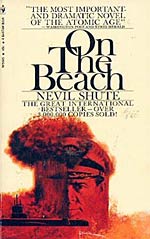
![]() BigEnk
BigEnk
4/2/2025
![]()
Insane to think that at the end of the world, as the nuclear dust settles farther and farther away from the blast sites, as people realize their impending certain and gruesome fate at the hands of radiation poisoning, Nevil Shute thought that what would be most important is to uphold power structures, a stiff upper lip, and continue your role until the bitter end.
On the Beach is almost primordially conservative in its views. The important distinction is that, given this apocalyptic situation, not only would humans cling to the known because of the fear that pervades their last days, but also that doing so will give them the most satisfaction and purpose. Without these structures, we are nothing. Without continuing the monotonous tasks, jobs, and duties of everyday life, we will drink ourselves to death, which is really the only way that people lose control in the novel. Shute is completely unconcerned with larger scale changes in society, or any form of civil unrest. Society remains for the large part completely unchanged. There are no revolutions, no spiritual upheavals, nothing. Life goes on much the same as it had been, and this lack of imagination is both a symptom of Shute's worldview and unfortunately creeps into the narrative and prose.
What Shute IS concerned with is following both the explicit and unsaid rules that dictate society and honor. He believes in labor for labors sake, that labor intrinsically gives humanity some of the highest purpose they can experience. In my opinion these views are shallow and pessimistic, a monochrome perspective on what it means to be human. I felt a fundamental disconnect with the work the entire time I was reading it.
For awhile I questioned whether my opinion of On the Beach rested solely on my disagreement with his values, but I think I can concretely say that I had a distaste for the rest of the novel too. Even though it's regarded as a classic of the genre, the meat of the story doesn't really have much to do with anything SF at all. We spend a lot of time seeing the day to day activities of strained yet normal life for a cast of characters that I struggled to connect with. Few characters do anything of real importance outside their normal routines, only taking a day or two vacation during the months leading up to their deaths. It's a dull narrative, one feels very much like soap opera or movie from the 50's.
Most of the characters are so deluded about the current state of events that they plan for the years to come, planting gardens that will never sprout or repairing fence lines weeks before their death. It's an odd way to spend most of the meat of the novel, where only briefly are we granted reprieves in which characters have honest, sober conversations about their circumstances. These sober discussions are the highlight of the entire novel, and something that I wish Shute had spent more time on. Sometimes this delusion is so strong that I couldn't help but feel that everyone is so mentally unwell that I can't take anything they say seriously.
As a sidenote, Shute has a curious tendency to refer to the one infant character as 'it'. I really don't have an commentary about this piece of the novel, outside of it being rather unsettling and cold, but it's so memorably awkward I had to note it.
The ending, while touching, doesn't make up for the fundamental problems with the rest of the work. Perhaps interesting for its historical perspective, but ultimately unfulfilling and baffling.